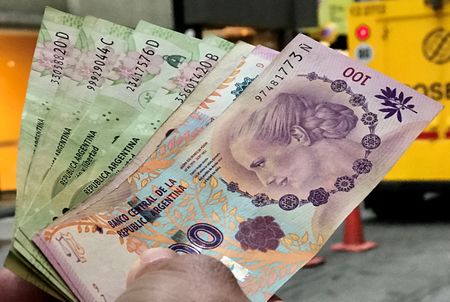By Eliana Raszewski
BUENOS AIRES (Reuters) – Argentina will roll out a new 2,000-peso bill, the central bank said on Thursday, which would double the face value of the country’s top denomination bank note, but would still only be worth $11 officially and $5 in commonly used parallel markets.
The South American country is battling one of the world’s highest inflation rates, with prices climbing 95% last year, and a steady devaluation of the peso, which means Argentines and tourists often carry huge stacks of bills to make payments.
The largest current bill, the 1,000 peso note, is worth just $2.70 on the alternative markets most people use to exchange currency, including through formal money exchange firms. Buying dollars at the official rate is strictly limited.
Given the new 2,000 peso note would still leave Argentina’s largest tender as one of the lowest-valued in the region, a 5,000 peso bill is being studied, according to a source from the central bank, though has not yet been given approval.
“The 2,000 peso denomination will be integrated into the current peso series,” the central bank said in a statement. It did not directly refer to the rising pressures of inflation or say when the new note would enter the market.
Bankers have raised concerns about the cost of storing an increasingly large volume of bills in bank vaults, while consumers and tourists often complain about having to fill bags with cash to make even regular payments.
Argentina’s tender has lost so much value in recent years that one local artist uses banknotes for painting on because they are cheaper than a canvas.
(Reporting by Eliana Raszewski; Additional reporting by Walter Bianchi; Editing by Andrea Ricci)

